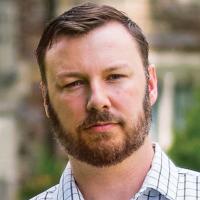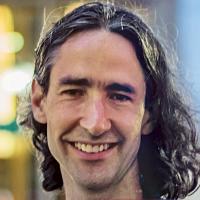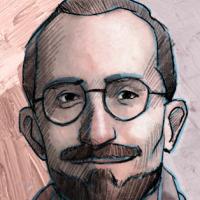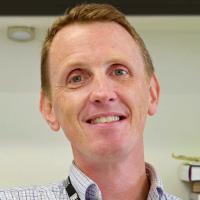
Ryan Adams
Modeling Agency Formally
Emergent intrinsic motivations in intelligent collectives
Subaward Principal Investigator
Princeton University
Ryan Adams is a machine learning researcher and Professor of Computer Science at Princeton University. Ryan completed his Ph.D. in physics under David MacKay at the University of Cambridge, where he was a Gates Cambridge Scholar and a member of St. John's College. Following his Ph.D. Ryan spent two years as a Junior Research Fellow at the University of Toronto as a part of the Canadian Institute for Advanced Research. From 2011-2016, he was an Assistant Professor at Harvard University in the School of Engineering and Applied Sciences. In 2015, Ryan sold the company he co-founded, Whetlab, to Twitter and he spent three years in industry at Twitter and Google before joining the faculty at Princeton in 2018. Ryan has won paper awards at ICML, UAI, and AISTATS, received the DARPA Young Faculty Award and the Alfred P. Sloan Fellowship. He also co-hosted the popular Talking Machines podcast.

Arvid Ågren
Modeling Agency Formally
The paradox of the organism
Subaward Principal Investigator
Uppsala University
J. Arvid Ågren is an evolutionary biologist, currently a Wenner-Gren Fellow at the Evolutionary Biology Centre at Uppsala University. His research focuses on genomic conflicts and he has published widely on their biology and implications for evolutionary theory. He also works on foundations of selfish gene theory and is the author of The Gene’s-Eye View of Evolution (Oxford University Press 2021). He holds degrees from the universities of Edinburgh and Toronto, and prior to joining Uppsala he was a postdoc at Cornell and Harvard.

Ben Allen
Modeling Agency Formally
Natural selection for collective purpose
Subaward Principal Investigator
Emmanuel College
I have always been interested in how math can help us understand big questions of evolution and behavior. Much of my work explores the evolutionary dynamics of social or collective behavior, and how this is affected by spatial or social network structure within the evolving population. More generally, I seek to deepen our understanding of evolution by proving mathematical theorems that apply to a wide range of evolutionary processes. I currently serve as an Associate Professor of Mathematics at Emmanuel College in Boston, MA. Before that, I obtained my PhD in Mathematics from Boston University, and completed a postdoc in Evolutionary Dynamics at Harvard University.

Matthieu Barbier
(Re)Conceptualizing Function and Goal-Directedness
Open-ended evolution and organizational closure
Subaward Principal Investigator
Matthieu searches for simplicity in macroscopic phenomena in theoretical ecology, often relying on ideas from statistical physics. He graduated in theoretical linguistics and physics, pursued a PhD in the latter in Paris, and explored various interfaces with economics and ecology in Incheon, Princeton and Moulis. He co-founded the interdisciplinary nonprofit Institut Natura e Teoria en Pirenèus, and is now employed as a researcher at the Plant Health Institute in Montpellier, France. His variegated experiences have left him with two major archetypes for how he thinks about intriguing phenomena in life, cognition and society: from physics, the duality and equivalence between causal (force-based) and acausal (variational) explanations; from linguistics, the separation of concerns between historical (etymological) and functional (grammatical or semantic) subfields. He hopes to use these archetypes to better understand, and formalize mathematically, the equivalences and tensions that he has encountered between various modes of scientific explanation of biological phenomena.

Gillian Barker
Higher-Level Agency and Directionality in Ecology and Earth Science
Geofunctions: purposes and agents in global environmental sciences
Subaward Principal Investigator
University of Pittsburgh
Gillian Barker received her training at the University of Toronto and the University of California, San Diego. She is Visiting Research Professor in the Department of History and Philosophy of Science at the University of Pittsburgh, and a member of the Rotman Institute of Philosophy at Western University. Dr. Barker’s research examines how the biological and social sciences deal with causal complexity, and how science can make sense of apparent normativity, intentionality, and teleology in the natural world. Her current work focuses on the distinctive features of complex adaptive systems, exploring how scientists can best grapple with these in investigating ecological resilience and evolutionary dynamics, human cognition and social behavior, and the interconnected global-scale processes upon which human societies depend. Dr. Barker is author of Beyond Biofatalism: Human Nature for an Evolving World, and co-author with Philip Kitcher of Philosophy of Science: A New Introduction.

Pierrick Bourrat
Evolutionary Origins and Transitions of Agency
Transitions in individuality: from ecology to teleonomy
Subaward Principal Investigator
Macquarie University
Pierrick is a philosopher of biology at Macquarie University, in Australia, with a background in evolutionary biology and ecology. Pierrick works mainly on conceptual issues related to evolutionary theory, the concept of biological individuality, and major transitions in evolution. He also has interests in the philosophy of causation and cognitive science.
Pierrick has recently published a short book at Cambridge University Press in which he explores the status of units and levels of selection in evolutionary theory. He proposes a suite of criteria to distinguish genuine from arbitrary or conventional units and levels of selection.

Philip Donoghue
Higher-Level Agency and Directionality in Ecology and Earth Science
Chance versus purpose in biosphere evolution
Subaward Principal Investigator
University of Bristol
Phil is Professor of Palaeobiology at the University of Bristol, UK. His research focusses on the causes and consequences of major evolutionary transitions, drawing insight from anatomical and molecular data from living and fossil organisms. Major themes include the origins of animals, plants, and the establishment of evolutionary timescales.

Charbel El-Hani
Higher-Level Agency and Directionality in Ecology and Earth Science
An organizational account of ecological functions
Subaward Principal Investigator
Federal University of Bahia (UFBA)
Charbel N. El-Hani is full professor in the Institute of Biology, Federal University of Bahia, Brazil. Coordinator of the History, Philosophy, and Biology Teaching Lab (LEFHBio) and the National Institute of Science and Technology in Interdisciplinary and Transdisciplinary Studies in Ecology and Evolution (INCT IN-TREE). Between January 2020 and July 2021, he was visiting researcher at the Centre for Social Studies, University of Coimbra, Portugal. He works in the areas of philosophy of biology, ecology, ethnobiology and science education research.
